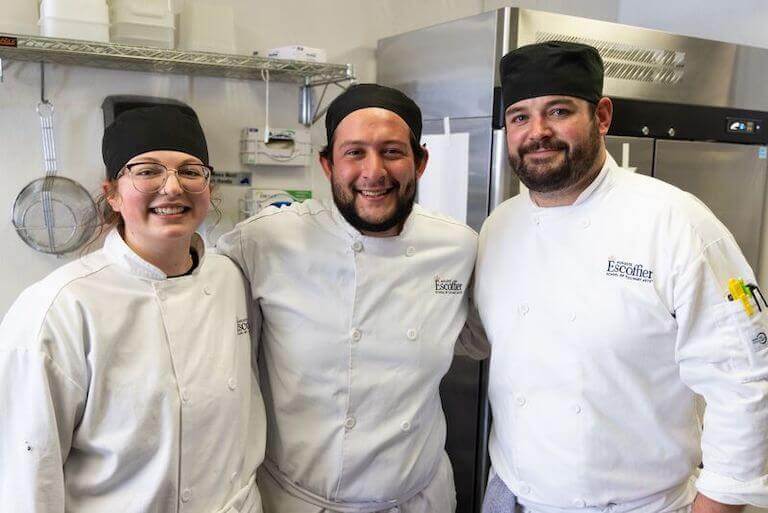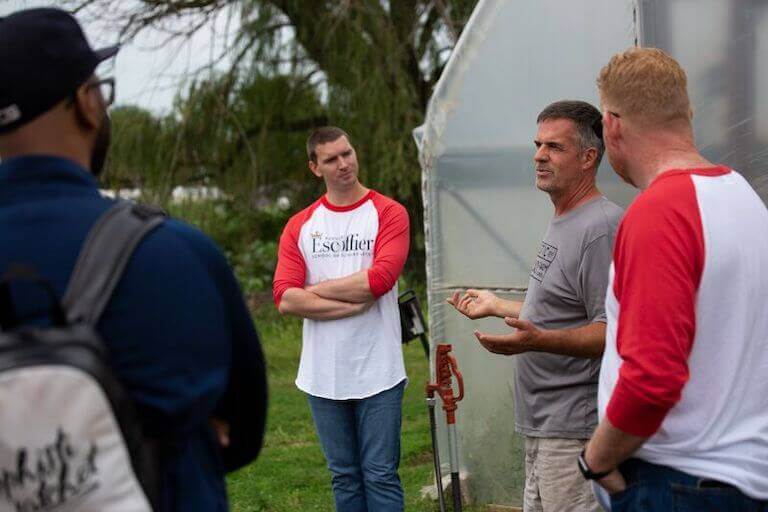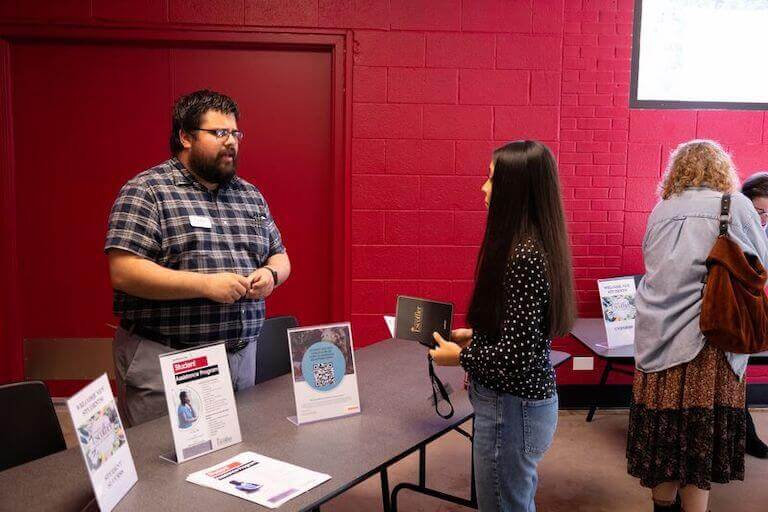Let’s face it—when you choose to attend a secondary school, sometimes it can feel like an isolating experience, navigating coursework and assignments on your own. However, if students garner a “sense of belonging” through networking and building relationships, this could make all the difference.
According to Dr. Terrell Strayhorn, “Sense of belonging is the ‘secret sauce’ that’s often missing from recipes for student success. Belonging matters. It’s essential to optimal learning & well-being. Belonging is not ‘soft stuff.’”* Needless to say, building a support network in culinary school is critical, and here are some best tips to get started.
1. Grab Coffee With Chef Instructors You Admire
In the vibrant, dynamic world of culinary arts, knowledge can equate to power. Here at Escoffier, you have access to over 120 seasoned Chef Instructors, who all offer unique wisdom from a variety of backgrounds.
For example, Chef Instructor Ashley Godfrey spent years working in hospitality management at Walt Disney World before teaching at Escoffier. Chef Instructor Anne Tutuska cooked for several well-known athletes within the Buffalo Sabres and Buffalo Bills organizations at Pegula Sports & Entertainment. Chef Instructor Eric Jenkins cooked for the White House.
Network of Escoffier Chef Instructors Include:
- 85 Executive Chefs
- 61 Current or Former Business Owners
- 18 Worked in Michelin Restaurants
- 16 Published Authors
Of course, as a student, you may likely interact with your instructors on a daily basis through class activities and email. But the dialogue doesn’t need to end there. Consider putting an office hours appointment on their calendar to better understand their background or ask for career advice. Chances are, they’ll be flattered that you’ve initiated a deeper mentorship.
“What I love most about my job is seeing my students progress week after week, and to share the knowledge I once got from my mentors with my students.”*
Chef Cesar Herrera, Escoffier Online Chef Instructor
2. Start a Peer Meetup Group
According to Dr. Vivienne Friday, “Supportive interactions with peers can influence overall academic development, knowledge acquisition, and self-esteem.”*
Of course, you may likely collaborate with several peers in and between classes, but it never hurts to create your own meetup group outside of the classroom. Not only can this help build strong camaraderie, but if you initiate this, it’s also a chance to refine your leadership skills—making this type of endeavor a great resume builder.
To start, consider defining how often the group will connect and what the meetup agenda will look like. Perhaps this is dedicated time to bounce ideas off each other, study before a quiz, chat through specific challenges, or simply converse about personal life and hobbies. If you’re an online student, and find yourself balancing a full-time job and other commitments, you can still initiate an online meetup group with your classmates via Zoom!

Group of Boulder campus students interacting together during a culinary class.
3. Participate in School Events
Here at Escoffier, we realize it’s necessary to foster a sense of community, which is why our faculty is always brainstorming new school events for ground campus and online students. One of the easiest ways to build your support network is through active participation in events outside of the classroom.
For example, students can sign up for a Farm-to-Table Experience, which may include activities like touring Three Sisters Farm, owned by Chef Instructor Steven Nalls, to explore sustainable practices and participate in a hands-on preparation of a family dinner. If you’ve already started your own meetup group, you can even invite these friends to join in on the fun!

Farmer educating Escoffier students at an event.
4. Maximize Your Externship
Depending on the program you choose at Escoffier, each student must complete one to two industry externships as a requirement before graduation. This is a prime opportunity for students to find a restaurant or hospitality establishment that aligns with their interests and further refine their skill set. Aside from this, externships can open doorways for students to interact with seasoned culinarians—potentially building long-lasting connections that could lead to future job opportunities.
“The externship class can allow students–even those with no prior experience–to get their foot in the door. Once they gain that valuable experience, it may be easier for them to determine which path they want to take with their careers.”*
Maria Davenport, Hospitality & Restaurant Operations Management Instructor
During externships, it’s essential to absorb as much hands-on experience as you can and ask as many questions as possible. By showing up with an open mind and being inquisitive, you can start to forge unbreakable relationships you may be able to cultivate throughout the entirety of your career.
5. Utilize Career Services
While in culinary school, it’s important to think about your future career goals and build relationships with those who can support you in these endeavors. Students can get access to EConnect—a unique career platform created by Auguste Escoffier Global Solutions. By tapping into this marketplace of potential employers, you can quickly bolster your support network.
Depending on the culinary niche you choose to pursue, you can connect with future employers who may match your job criteria. Plus, you don’t have to navigate this alone, as Escoffier’s Career Services can collaborate with you to take these next steps.

Students networking at an Escoffier career event in Boulder.
Find a Sense of Belonging in Culinary School
Attending culinary school isn’t just about obtaining the skills it can take to become a chef—it’s a major opportunity to connect with like-minded individuals who exude the same passion. Plus, building a support network throughout your educational journey can lead to a keen sense of belonging—which may help you feel empowered to take the next step in your career!
Contact us to explore how a culinary education can help you achieve your culinary dreams.
Enjoyed this article? Read these ones next:
- What to Expect When You Attend Culinary School
- Escoffier 101: Everything You Need to Know About Culinary School
- How Can You Get Into Culinary School
*Information may not reflect every student’s experience. Results and outcomes may be based on several factors, such as geographical region or previous experience.

 “What I love most about my job is seeing my students progress week after week, and to share the knowledge I once got from my mentors with my students.”*
“What I love most about my job is seeing my students progress week after week, and to share the knowledge I once got from my mentors with my students.”* “The externship class can allow students–even those with no prior experience–to get their foot in the door. Once they gain that valuable experience, it may be easier for them to determine which path they want to take with their careers.”*
“The externship class can allow students–even those with no prior experience–to get their foot in the door. Once they gain that valuable experience, it may be easier for them to determine which path they want to take with their careers.”*